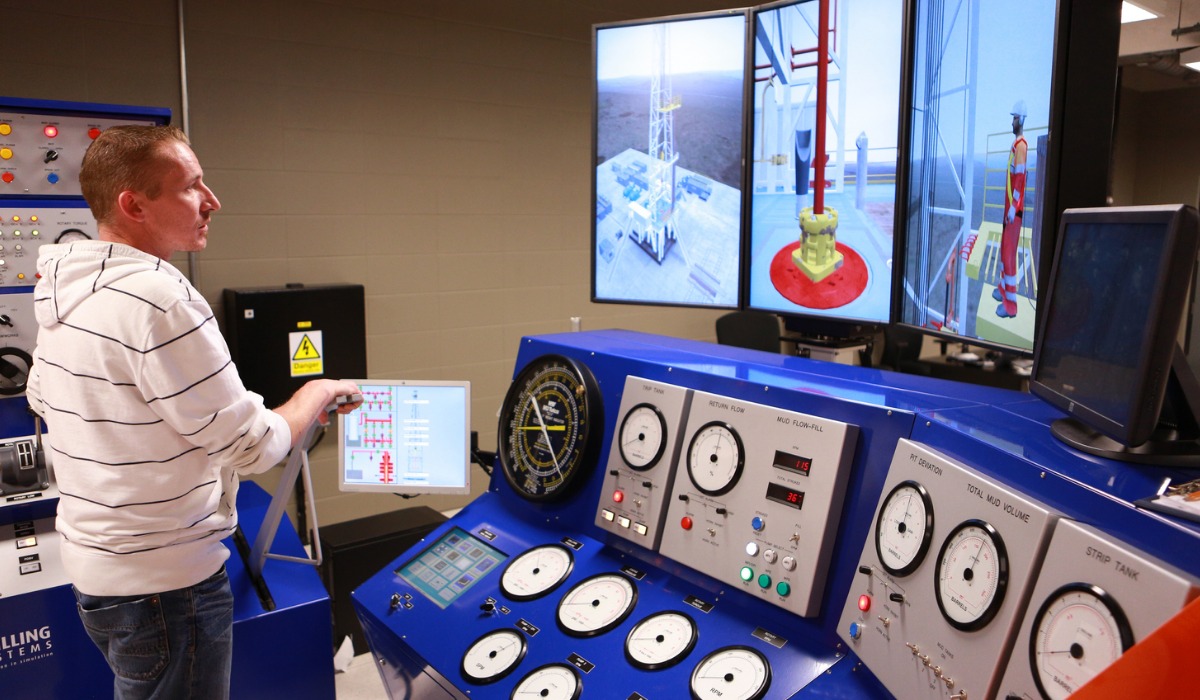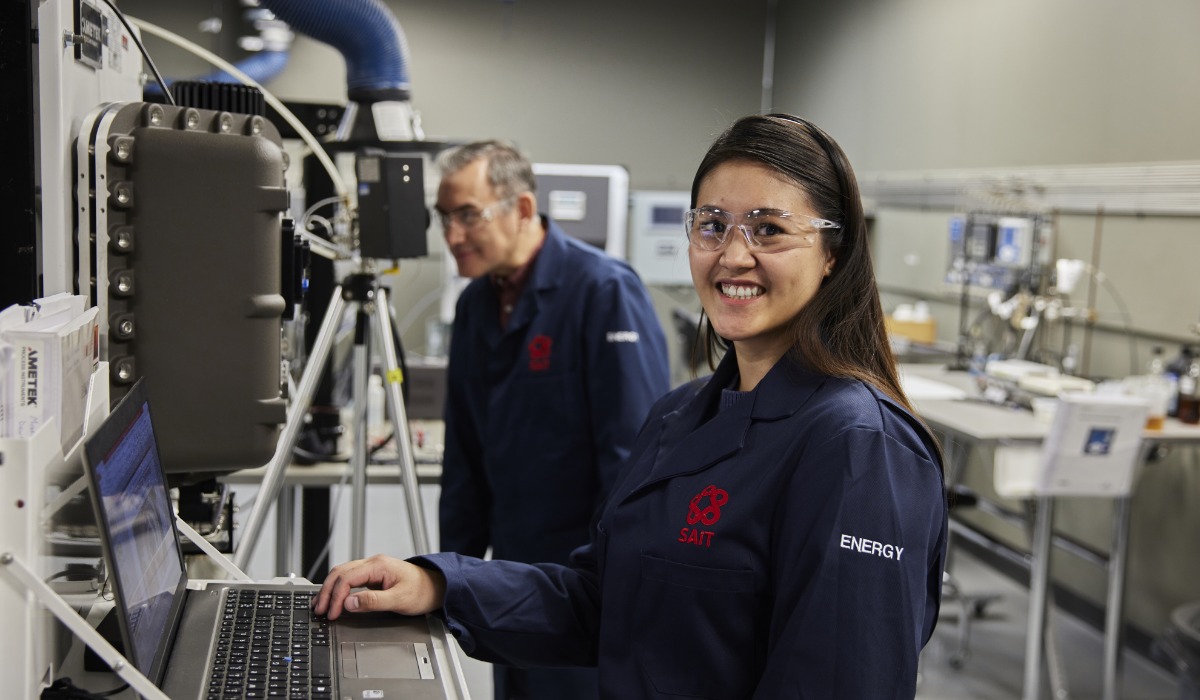Mandatory requirements
Applicants for this program are required to have previously completed post-secondary studies at an accredited post-secondary institution. Review admission requirements for more details.
Overview
The Bachelor of Applied Technology in Petroleum Engineering is for individuals with an existing technical degree or diploma who want to rise to the next level in the petroleum industry.
This program is an essential stepping stone to a fulfilling career within the upstream petroleum sector, including gas process engineering and facilities design.
You will explore the core segments of the petroleum industry and gain a thorough grounding in:
- oil and gas exploration, including the techniques and challenges involved in discovering new petroleum reservoirs
- drilling engineering, acquiring skills in drilling mechanics and operations, understanding the complexities of building wells
- the behaviour of oil and gas reservoirs and how to maximize resource extraction
- the phases of production, from wellbore to surface operations, ensuring efficiency and sustainability
- oil and gas facilities design and operation, engaging in the design, build and operation of facilities with an emphasis on safety and environmental considerations
- upgrading and refining operations, including the processes involved in converting crude oil into usable products, enhancing product value
- the tools for cost estimation, risk assessment and financial forecasting essential in the petroleum industry.
Customized learning pathways
Acknowledging that each student's interests and career goals are unique, our Bachelor of Applied Technology in Petroleum Engineering offers the flexibility to tailor your educational journey. You can select from various courses that align with your career goals.
As a graduate, you will be well-equipped to leverage your degree and prior technical background to tackle the challenges of the petroleum industry in Alberta and elsewhere.
You will be prepared for roles that demand strong technical and analytical skills. Whether you're aiming for technical leadership or innovation in engineering practices, this program is your launchpad into the diverse and dynamic field of petroleum engineering.
Those in the petroleum engineering field tend to be objective, innovative, and directive.
You need:
- an aptitude for math, chemistry and physics
- organizational, interpersonal and communication skills
- the ability to work alone and with a team.
You should be comfortable analyzing data, creative problem-solving, working with tools and instruments to perform your work with precision, and be at ease taking charge.
You'll participate in two practicums and present a final report on your work.
During your practicums, you'll gain at least 750 hours of work experience in a paid or unpaid position in the petroleum industry. Your final report will be a major technical report based on the experience and data gathered on the job.
For each practicum, there is a minimum number of work hours that must be completed over a maximum of 15 weeks:
- PRAC400 - minimum 400 hours over a maximum period of 15 weeks
- PRAC410 - minimum 350 hours over a maximum period of 15 weeks
You will be responsible for finding your work position, but SAIT advisors will assist you as much as possible.
Graduates of this program may be considered for accreditation with the Association of Professional Engineers and Geoscientists of Alberta (APEGA), provided you meet the established criteria and are successful in the assessment process.
After successfully completing this program, you'll receive a SAIT Bachelor of Applied Technology Petroleum Engineering degree.
Careers and opportunities
Each year, SAIT conducts a survey between February and April to determine the employment rate, salary and satisfaction of our newest SAIT alumni.
![]() 77% graduate employment rate
77% graduate employment rate
![]() $58,450 average starting salary
$58,450 average starting salary
Find out more about our graduate employment statistics >
Our graduates may work in the following occupations. Some careers require additional experience and education.
Associated National Occupational Classification (NOC) codes: 20010, 21332, 22101, 83101, 84101, 92011, 93101, 82021, 85111.
Career planning support
Unsure which career path is for you? Here are some recommended career planning resources to help you decide your future.
You can also head to Alberta alis for lots of information about careers in Alberta, including quizzes and labour market information to help you narrow down a path.
Finally, you can take our online career finder quiz, which can help narrow your options based on your current skills and interests.
Courses
The Bachelor of Applied Petroleum Engineering Technology requires 57 credits for completion.
The program consists of:
- Petroleum engineering core courses - 13.5 credits
- Elective courses - 27 credits
- Work experience - 30 credits
You must take all of the following courses to complete this program.
Petroleum engineering core
| Course | Credits |
|---|---|
|
Describes the properties of petroleum reservoir fluids (gas, oil, and water) important to understanding and predicting reservoir behaviour. These properties include the effects of temperature, pressure, and composition on gas solubility in oil and water, fluid volume/density, and fluid viscosity. The course also includes the fluid behaviours required for numerical reservoir flow simulation. These behaviours will include single component fluid phase changes (e.g. liquid and vapour), multi-component fluid phase changes, gas-liquid equilibrium, and various Equations of State. |
1.5 |
|
This course will introduce learners to a variety of technical communications, including technical documents, reports, career portfolios, and professional presentations produced in relevant industry settings. Learners will gain an understanding of the strategies and skills required for effective communication in a professional environment. Course work will require learners to work in individual and collaborative settings. |
3 |
|
This course will provide the student with an overview of the drilling operation, including hardware and operational technologies, drilling rig components, drillstring properties and components, BOP and other safety system fundamentals, kick detection, mud formulation and property determination and adjustment, pressure drop calculations in the drillstring and annulus, and casing systems. |
1.5 |
|
The course will introduce basic economics concepts with their terminology, including the time value of money and discounted cash flows, and cover taxes and land resource ownership in Alberta, partnership agreements, Alberta Government agencies and their roles, oil and gas production rate limitations in Alberta, sales contracts in Alberta, and profitability analysis. |
1.5 |
|
Physical geology principles will be reviewed, including the dynamic nature of the Earth, plate tectonics, the formation of rocks, especially sedimentary rocks, and the geologic history of western Canada. Emphasis will be placed on the relationship of these principles to their applications in the petroleum industry. This foundational knowledge builds a common base, allowing the exploration of critical petroleum geology topics including: the relationship of sedimentary rock formation to reservoir characteristics, hydrocarbon generation, hydrocarbon trapping mechanisms, and petroleum exploration techniques. |
1.5 |
|
This course deals with the procedures involved in placing a well on production, including completion methods, well stimulation by acidizing or fracturing, wellheads, chokes, artificial lift methods, valves and surface lines. Methods of analyzing an oil well pressure buildup test are handled with example problems to determine the reservoir permeability and skin factor on the well. Problem areas such as hydrate formation, corrosion, emulsion problems and phase measurement are discussed. Surface facilities such as separators, treaters, dehydration systems and metering are introduced, with calculation methods for sizing two and three phase separators, and pressure drop estimation methods in surface lines and fittings. |
1.5 |
|
The course provides an introduction to the different types of reservoirs, production drive mechanisms, absolute and effective porosity, permeability and relative permeability concepts, phase behaviour of hydrocarbon fluids, and Darcy's Law. Oil and gas reserves categorization and estimation will also be introduced, including volumetric, material balance, and decline curve analysis methods. |
1.5 |
|
This course enables the student to obtain a level of proficiency in both applied engineering fluid mechanics and introductory thermodynamics, to apply those principles to scientific and technological problems, to critically analyze fluid systems, and to solve practical applications. Topics include basic fluid properties, fluid pressure, manometers, flow rate, Bernoulli's equation, fluid laminar and turbulent flow, Reynold's number, major and minor friction losses, pipeline systems, pump selection, heat, temperature, internal energy, laws of thermodynamics, calorimetry, and ideal gases in a closed system. |
1.5 |
Work experience
| Course | Credits |
|---|---|
|
This course is designed to assess and to verify the student's competency in a variety of technical, professional, and interpersonal functions in a job situation within the energy industry. Upon arranging a work experience practicum assignment, the student will create and then complete a work experience verification report. The student will be responsible for submitting a series of quarterly reports based on the student's activities in the employment setting. |
15 |
|
In this course, the student will prepare a major technical report from experience and data gathered on the job. The student will outline this report in conjunction with a job supervisor and a program advisor, and will then present the completed report to a jury for explanation and further analysis and approval. Pre-requisites:
|
15 |
You will choose courses from the following lists to earn 27 credits.
Core elective (choose two to four)
| Course | Credits |
|---|---|
|
Much of today's business is accomplished more through teamwork than individual effort. This course presents current concepts of teams and team skills through the following topics: team performance and improvement, commitment, painting the vision, leadership in today's business, obstacles and trouble, achievement celebration, teams in changing organizations, quick change organizations and coaching the team. Students participate as team members and will complete four team projects. |
1.5 |
|
Beginning the financial plan with goals, this course will touch on forecasts and estimates, financing, and cash flow. The processes of budgeting and financial control involving authorization, feedback and analysis will be covered in more detail. Student workshop exercises will simulate real business situations. |
1.5 |
|
Beginning with project planning methods and tools, this course concentrates on schedule and cost control from inception to completion of a project, overcoming obstacles to success, measurement of progress, and quality control. The use of software tools will be included, reviewed and discussed as available. |
1.5 |
|
The following topics are covered in this course: building a safety program, safety and environmental law, general industrial safety, process safety management, hazard identification and control, worksite inspections, contractor control, emergency response planning, incident investigation and analysis, and safety program audits. WHMIS and TDG certificates may be earned if time permits. |
1.5 |
Complementary elective (choose 10 to 12)
| Course | Credits |
|---|---|
|
The following process engineering subjects are covered: diagrams used in process engineering (block flow diagrams, process flow diagrams and process and instrumentation (P&I) diagrams); unit operations of chemical engineering (an overview of fluid flow, heat transfer and mass transfer operations); sizing of typical equipment (process lines, pumps, compressors, heat exchangers, two and three phase separators and fractionation towers). The course includes presentation of a typical mechanical design following a detailed process design and, time permitting, an introduction to computer based design programs such as Hysys and Pipesys. |
3 |
|
HYSYS software is used to design surface facilities. This includes separators, fractionation columns, dehydration systems, a chemical plant and other equipment design. Dynamic simulation of a chemical plant is included with controller tuning and adjustment; the effect of tuning parameters on process stability and behaviour is investigated. PIPESYS software is used to calculate and simulate flows in pipes and pipeline systems, with heat transfer from the pipeline, and offshore pipelines are modeled which are partly exposed to the atmosphere, immersed in seawater and buried. A design project is carried out by students using the above simulators. Pre-requisites:
|
3 |
|
The following technical material is presented: principles of process measurement and control; measurement techniques and instrumentation for process variables including pressure, flow rate, temperature, composition, pH, humidity and level control; process control systems, feedback control, PID control systems; systems analysis and modeling techniques and interaction of the process with the control system. Part of the course involves laboratory measurements and practicals using various measurement devices and control systems with evaluation of practical reports forming part of the course evaluation process. |
1.5 |
|
This is an overview of basic drilling practices followed by advanced drilling technology, planning, bit selection, hydraulics, blowout control and mud technology. Drilling of deviated wells, multiwells, horizontal wells and well completions are also covered, in addition to recent advances in drilling such as underbalanced drilling, coiled-tubing drilling, and slim hole drilling. Pre-requisites:
|
3 |
|
This course was designed to develop skill sets in the areas of: Compliance and Liability/Risk Assessment. This would include: contaminated site investigations, key player involvement and area jurisdiction, investigation processes, and provide the opportunity for individuals to perform monitoring of existing sites, ranging from facility license requirements to reclamation procedures and actual clean up of sites. Audit, Remediation, Sustainable development has become an industrial requirement for: Oil and Gas, Mining, Forestry, Commercial Real Estate, Farming, Banking, and the appraisal industry. Monitoring on existing sites, with detailed abilities to reclaim leases/sites to Alberta regulatory criteria specifications. |
1.5 |
|
This course will emphasize design, equipment sizing criteria, and application to mitigate contaminant release. Topics covered will include air and noise emissions, pollution control, reuse of produced water from heavy oil, contaminant hydrogeology, site remediation, and well abandonment. Pre-requisites:
|
1.5 |
|
This course provides an introduction to well log analysis, by discussing the major types of open-hole logs used in oil and gas exploration and their evaluations. Well logs are the most comprehensive and descriptive documents on oil and gas. Your analysis would impact the work of the rest of the team in the industry, from the financing department to the drilling team. This course is designed to deliver the optimum application of well logs by discussing the constraints and limitations of open-hole well logging operations. The principles of physics are explained along with the functioning of modern logging tools and an adequate number of examples for each logging tool will be provided to show the close relationship of petroleum geology and reservoir properties such as water saturation, porosity, and identification of hydrocarbon types. We also review the basics of the Quick- Look analysis enabling us to recognize reservoirs' features- quickly and effectively. Pre-requisites:
|
1.5 |
|
This course will cover the following topics: the main oil refining processes; these will include desalting, atmospheric and vacuum tower distillation, cracking, isomerization, alkylation, hydrogenation, desulfurization, coking processes; gaseous products, gasoline and diesel fuel properties and blending, octane numbers and additives, kerosene, lubricating oil and fuel oil properties. Petrochemical production processes will be introduced by considering separation processes for basic components; polymerization processes and the production processes for materials such as polyethylene, polypropylene, PVC, ethylene oxide and ethylene glycol, ethyl and isopropyl alcohols, acetic acid, and other basic organic materials used in industry; properties of petrochemical materials, thermoplastics, resins, fibres and foams. |
1.5 |
|
This course will cover the following topics: nodal analysis and production optimization, identification of production bottlenecks; emulsion-breaking and treater operations, types of chemicals used, use of combined thermal and chemical treatments; selected topics in artificial lift methods, pump selection, sucker rod pump dynamometer tests, gas lift design; cementing operations; acidizing and fracturing workover treatment design, additives used, proppant selection, application to vertical and horizontal wells; completion methods for horizontal wells; corrosion and control methods in downhole and surface equipment. Pre-requisites:
|
1.5 |
|
Well completions, stimulations and workover operations are important interventions that are required to optimize the economic recovery of petroleum resources. This course includes such topics as well programming, wellbore design and integrity, production logging, formation damage and acid stimulation with an emphasis on hydraulic fracturing. Pre-requisites:
|
3 |
|
This course deals with the latest production methods used for recovery of heavy oil using horizontal, vertical and multilateral wells, cold production, thermal techniques with steam flooding, CSS, SAGD, VAPEX, in-situ combustion, waterflooding and EOR techniques. Methods of predicting well and field productivities will be examined for the major recovery processes. The course will examine heavy oil PVT and analytical techniques, geology, field projects both within Canada and internationally, production problems, regulatory and fiscal issues. Comparisons with light oil production methods will be made, and differences in refining, upgrading, pipelining and transportation requirements for heavy oil will be highlighted. |
1.5 |
|
This course examines the methods used for surface mining recovery of oil sands and oil shales, the transportation methods to the processing plant, and various separation methods used to separate the bitumen and heavy oil from the sands. The different separation methods such as flotation and gravity will be discussed. |
1.5 |
Progression
You must attain a PGPA and/or a CGPA of 2.0 or better each semester and pass the prerequisite courses to progress through the program.
To qualify for graduation, you must pass all courses, attain a CGPA of 2.0 or better and complete course requirements within the prescribed timelines.
Review our grading and progression procedure >
Explore your options!
Some courses in this program are available through Open Studies. You can complete courses via Open Studies to get a head start on your education, reduce your course load once accepted into a credentialed program, or determine which career path best suits you before you fully commit.
You may also take courses for general interest or personal and professional development.
Admission requirements
Applicants educated in Canada
Applicants must demonstrate English language proficiency and meet one of the following requirements or equivalents:
- a two-year SAIT diploma with a grade point average of 2.5 or better in:
- Petroleum Engineering Technology
- Chemical Engineering Technology
- Mechanical Engineering Technology
- Instrumentation Engineering Technology
- Civil Engineering Technology
- Electrical Engineering Technology
- or similar engineering technology program, or
- a relevant science (mathematics, physics, chemistry, geology, or geophysics) or engineering degree. Additional courses may be required before starting the program.
Applicants with other qualifications may be considered upon submission of certified background information.
Registration in a Canadian Professional Engineering or a Certified Technologist organization can be substituted for the WES or SAIT assessments, subject to academic chair approval.
All applicants who were educated outside of Canada must demonstrate English language proficiency and provide proof they meet the program admission requirements outlined above with an international document assessment. Find accepted educational documents and assessment options.
SAIT may also accept courses completed at certain international post-secondary institutions.
Academic Upgrading
Missing an admission requirement for this program? Upgrade your prior education to help you receive admission into one of SAIT's career programs.
English language proficiency
All applicants must demonstrate English language proficiency prior to admission, including students educated in Canada.
Transfer agreements
At SAIT, we have created transfer agreements with partner institutions to allow you to earn course credits toward your SAIT program based on your previously completed credentials.
Transfer Alberta search tool
Use the Transfer Alberta search tool to see all transfer agreements between Alberta post-secondary institutions (including those with the University of Calgary, Mount Royal University and Bow Valley College.)
Search transfer agreements in Alberta
Transfer options for graduates
When you have completed this program, you may continue your education at a partner post-secondary institution. These transfer agreements include partnerships within and/or outside of Canada.
Available intakes
Fall 2026
Start dates:
- Domestic students: Open
-
-
Application deadline: June 30, 2026
-
- International students: Open
-
-
Application deadline: May 29, 2026
-
Winter 2027
Start dates:
- Domestic Students (apps open March 4, 2026): Closed
-
-
Application deadline: Oct. 23, 2026
-
- International students: Open
-
-
Application deadline: Oct. 9, 2026
-
Costs
2025/26 tuition and fees
The following estimated costs are effective as of July 1, 2025.
The estimated total cost of tuition and fees is based on the suggested schedule of study. Following a modified schedule will impact the fees you pay per semester and may alter final costs.
The second year of this program is dedicated to a practicum placement where you will earn 30.0 credits towards your degree. Only billable hours amounting to 5.7 credits are used to calculate the tuition rate for this year.
Domestic students
The program total is based on the estimated amount you will pay if you enter this program during the 2025/26 academic year. The program total amount listed on your letter of admission may appear higher. This amount is your maximum tuition guarantee for the program. SAIT will not exceed this maximum, regardless of changes in tuition and fees between academic years.
Books and supplies are approximately $1,000 - $1,500 per full-time year.
This is a bring-your-own-device program with a standard computer hardware and software requirement. See the specific requirements on our computers and laptops page.
The industry-approved PPE you'll need will be discussed during your first few days of classes.
Find your booklist on the SAIT Bookstore's website. The booklist will be available closer to the program start date.
Can't find your program or course? The bookstore didn't receive a textbook list. Contact your program directly to determine if they're still refining course details or if you're in luck; no textbook purchase is required this term.
Financial aid
Paying for your education may feel overwhelming, but we have resources and programs that can help, including information about payment options, student loans, grants and scholarships.
Application process
Ready to apply?
Follow our step-by-step guide to submitting a successful application.
Communication during admission
Email is the primary source of communication during the selection process. Ensure your personal email account is managed appropriately to receive our emails, files and communications. We recommend you add the macphail.students@sait.ca domain to your safe senders' list or you risk missing critical email messages.
Begin your application
Apply now using the online application portal.
Ensure you have a valid Visa or Mastercard to pay the non-refundable application fee of $120 for domestic applicants or $175 for international applicants.
Information sessions
Prepare for a strong start in your chosen program or get the details you need to decide your future path.
Our expert staff and faculty are ready to answer your questions and provide information about the following:
- What sets SAIT apart
- An introduction to the program and area of study
- Admission requirements
- Future career paths
- Information on the earning potential and graduate employment rates.
Contact us
MacPhail School of Energy
-
Phone - 403.284.8451
International Student Advising
-
Phone - 403.284.8852
-
Email - international@sait.ca
Subscribe for updates
Your journey starts here! Sign up to get important updates on:
- Energy and environment programs
- Application information
- Relevant news and events

Oki, Âba wathtech, Danit'ada, Tawnshi, Hello.
SAIT is located on the traditional territories of the Niitsitapi (Blackfoot) and the people of Treaty 7 which includes the Siksika, the Piikani, the Kainai, the Tsuut’ina and the Îyârhe Nakoda of Bearspaw, Chiniki and Goodstoney.
We are situated in an area the Blackfoot tribes traditionally called Moh’kinsstis, where the Bow River meets the Elbow River. We now call it the city of Calgary, which is also home to the Métis Nation of Alberta.




